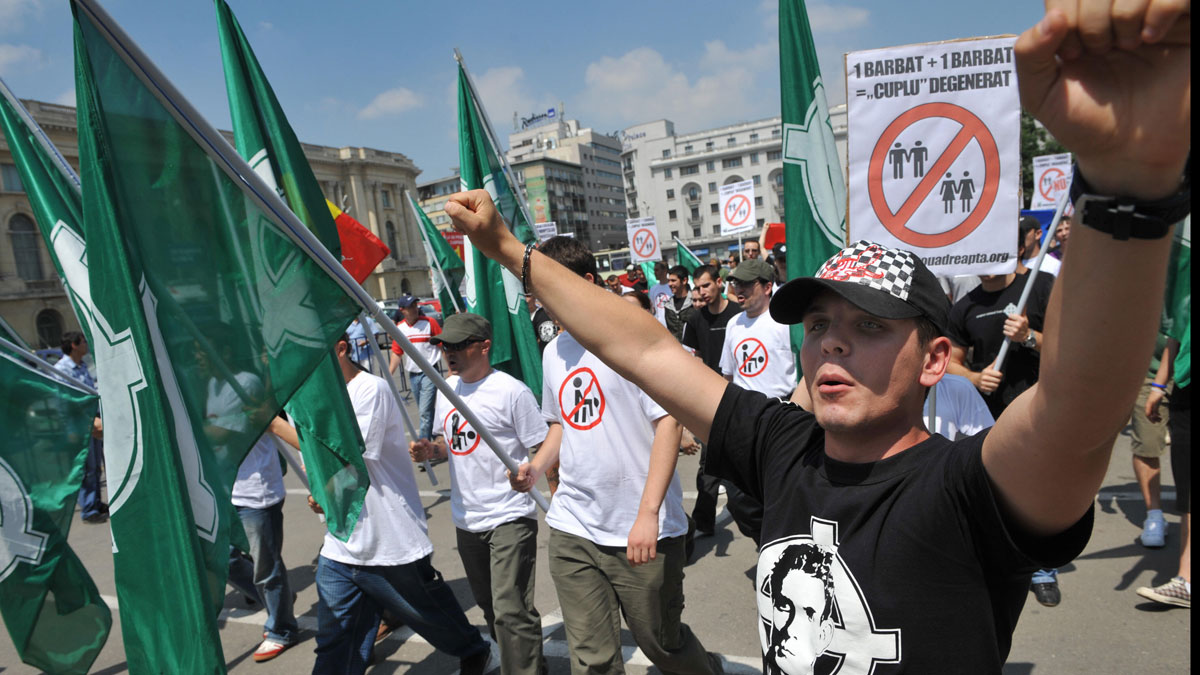Romania bans Holocaust denial and promotion of fascism
New legislation targets ultra-nationalist groups who revere WWII far-right paramilitaries

A free daily email with the biggest news stories of the day – and the best features from TheWeek.com
You are now subscribed
Your newsletter sign-up was successful
Romania has officially outlawed the denial of Romania's complicity in the Holocaust, amending previous legislation that only outlawed denial of the Holocaust as a historical fact.
The bill was approved by the Romanian parliament last month and signed into law by President Klaus Iohannis on Wednesday.
More than a quarter of a million Romanian Jews and 11,000 Roma were sent to their deaths under the Nazi-allied regime of dictator Ion Antonescu. Romanian troops were complicit in the deportation of Jews and mass killings. Under the new law, denying this involvement in the Holocaust will be illegal. Eighteen countries currently have some form of legislation dealing with Holocaust denial.
The Week
Escape your echo chamber. Get the facts behind the news, plus analysis from multiple perspectives.

Sign up for The Week's Free Newsletters
From our morning news briefing to a weekly Good News Newsletter, get the best of The Week delivered directly to your inbox.
From our morning news briefing to a weekly Good News Newsletter, get the best of The Week delivered directly to your inbox.
According to The Blaze, the legislation also bars "fascist, racist or xenophobic organisations and symbols" and "promoting people guilty of crimes against humanity", with a potential penalty of up to three years' imprisonment.
The new amendments are targeted at the handful of active far-right groups operating in the country, particularly those who celebrate or imitate the fascist Iron Guard 'Legionary' movement, active in Romania from 1927 to 1941. The ultra-nationalist paramilitary group was responsible for the assassination of Liberal prime minister Ion Duca in 1933, as well the Bucharest Pogrom of 1941 in which 125 Jews were tortured and killed.
The largest of the Romanian far-right groups, Noua Dreapta (New Right), uses a Celtic cross symbol similar to the Iron Guards's own emblem, and reveres their founder Corneliu Codreanu, respectfully referred to as 'the Captain'.
Believed to have up to 2,000 members, Noua Dreapta combines militant nationalism with a fervent devotion to the Orthodox Church, and is opposed to – among other things – homosexuality, abortion, interracial marriage, Communism, globalisation, the EU and democracy.
A free daily email with the biggest news stories of the day – and the best features from TheWeek.com
In 2003, the US International Religious Freedom Report claimed Noua Dreapta had "repeatedly harassed verbally and sometimes physically" Mormons in several cities around Romania. The group was also fined in 2005 for attempting to break up a GayFest pride parade in Bucharest.
-
 How the FCC’s ‘equal time’ rule works
How the FCC’s ‘equal time’ rule worksIn the Spotlight The law is at the heart of the Colbert-CBS conflict
-
 What is the endgame in the DHS shutdown?
What is the endgame in the DHS shutdown?Today’s Big Question Democrats want to rein in ICE’s immigration crackdown
-
 ‘Poor time management isn’t just an inconvenience’
‘Poor time management isn’t just an inconvenience’Instant Opinion Opinion, comment and editorials of the day
-
 Epstein files topple law CEO, roil UK government
Epstein files topple law CEO, roil UK governmentSpeed Read Peter Mandelson, Britain’s former ambassador to the US, is caught up in the scandal
-
 Iran and US prepare to meet after skirmishes
Iran and US prepare to meet after skirmishesSpeed Read The incident comes amid heightened tensions in the Middle East
-
 Israel retrieves final hostage’s body from Gaza
Israel retrieves final hostage’s body from GazaSpeed Read The 24-year-old police officer was killed during the initial Hamas attack
-
 China’s Xi targets top general in growing purge
China’s Xi targets top general in growing purgeSpeed Read Zhang Youxia is being investigated over ‘grave violations’ of the law
-
 Panama and Canada are negotiating over a crucial copper mine
Panama and Canada are negotiating over a crucial copper mineIn the Spotlight Panama is set to make a final decision on the mine this summer
-
 Why Greenland’s natural resources are nearly impossible to mine
Why Greenland’s natural resources are nearly impossible to mineThe Explainer The country’s natural landscape makes the task extremely difficult
-
 Iran cuts internet as protests escalate
Iran cuts internet as protests escalateSpeed Reada Government buildings across the country have been set on fire
-
 US nabs ‘shadow’ tanker claimed by Russia
US nabs ‘shadow’ tanker claimed by RussiaSpeed Read The ship was one of two vessels seized by the US military